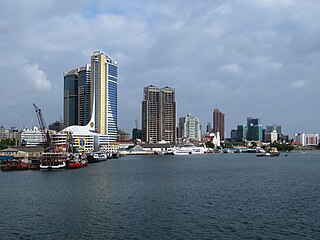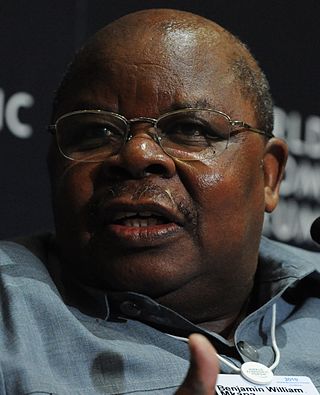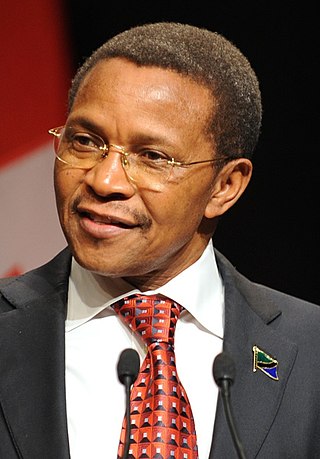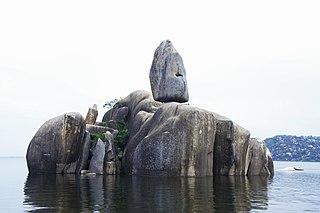
Dar es Salaam is the largest city and financial hub of Tanzania. It is also the capital of the Dar es Salaam Region. With a population of over nine million people, Dar es Salaam is the largest city in East Africa by population and the sixth-largest in Africa. Located on the Swahili coast, Dar es Salaam is an important economic center and one of the fastest-growing cities in the world.

Swahili, also known by its local name Kiswahili, is a Bantu language originally spoken by the Swahili people, who are found primarily in Tanzania, Kenya, and Mozambique. Estimates of the number of Swahili speakers, including both native and second-language speakers, vary widely. They generally range from 150 million to 250 million; with most of its native speakers residing in Tanzania.

Tanzania, officially the United Republic of Tanzania, is a country in East Africa within the African Great Lakes region. It is bordered by Uganda to the northwest; Kenya to the northeast; the Indian Ocean to the east; Mozambique and Malawi to the south; Zambia to the southwest; and Rwanda, Burundi, and the Democratic Republic of the Congo to the west. According to the 2022 national census, Tanzania has a population of around 62 million, making it the most populous country located entirely south of the equator.

The economy of Tanzania is a lower-middle income economy that is centered around Manufacturing, Tourism, Agriculture, and financial services. Tanzania's economy has been transitioning from a planned economy to a market economy since 1985. Although total GDP has increased since these reforms began, GDP per capita dropped sharply at first, and only exceeded the pre-transition figure in around 2007.

Zanzibar is an insular semi-autonomous region which united with Tanganyika in 1964 to form the United Republic of Tanzania. It is an archipelago in the Indian Ocean, 25–50 km (16–31 mi) off the coast of the African mainland, and consists of many small islands and two large ones: Unguja and Pemba Island. The capital is Zanzibar City, located on the island of Unguja. Its historic centre, Stone Town, is a World Heritage Site.

Dodoma, officially Dodoma City, is the capital of Tanzania and the administrative capital of both Dodoma Municipal Council and the entire Dodoma Region, with a population of 765,179.. On July 2024, it was official that Dodoma has surpassed Arusha to become the third largest city in Tanzania on both infrastructure and population measures. In 1974, the Tanzanian government announced that Tanzania's federal capital would be moved from Dar es Salaam to Dodoma for social and economic reasons and to centralise the capital within the country. It became the official capital in 1996.

Benjamin William Mkapa was the third president of Tanzania, in office from 1995 to 2005. He was Chairman of the Revolutionary State Political Party.

Moshi is a municipality and the capital of Kilimanjaro region in the Northeastern Tanzania. As of 2017, the municipality has an estimated population of 201,150 and a population density of 3,409 persons per km2. In the last official census of 2022, the municipality had a population of 221,733. The municipality is situated on the lower slopes of Mount Kilimanjaro, a dormant volcano that is the highest mountain in Africa. The name Moshi has been reported to refer to the smoke that emanates from the nearby mountain. The municipality covers about 59 square kilometres (23 sq mi) and is the smallest municipality in Tanzania by area.

Jakaya Mrisho Kikwete is a Tanzanian politician who was the fourth president of Tanzania, in office from 2005 to 2015.

Dodoma Region is one of Tanzania's 31 administrative regions. The regional capital is the city of Dodoma. Dodoma is located in central Tanzania, bordered by Singida region to the west, Manyara region to the north, Iringa region to the south, and Morogoro region to the east. Dodoma region hosts the nation's capital city, where the legislative assembly of Bunge is based. Dodoma region also hosts one of the largest universities in Tanzania: University of Dodoma. The region is the home of the Tanzanian wine industry, which is the second largest wine industry on the continent after South Africa. According to the 2022 national census, the region had a population of 3,085,625; in the 2012 national census, the population was 2,083,588.

Mwanza City, also known as Rock City to the residents, is a port city and capital of Mwanza Region on the southern shore of Lake Victoria in north-western Tanzania. With an urban population of 3,699,872 in 2022, it is Tanzania's second largest city, after Dar es Salaam. It is also the second largest city in the Lake Victoria basin after Kampala, Uganda and ahead of Kisumu, Kenya at least in population size. Within the East African community, Mwanza city is the fifth largest city after Dar es Salaam, Nairobi, Mombasa, and Kampala. It is slightly ahead of Kigali, Kisumu, and Bujumbura in the population of city proper limits. Mwanza city is also the capital city of Mwanza Region, and is administratively divided into two municipal districts within that Region - Ilemela and Nyamagana.

The University of Dar es Salaam (UDSM) is a public university located in Ubungo District, Dar es Salaam Region, Tanzania. It was established in 1961 as an affiliate college of the University of London. The university became an affiliate of the University of East Africa (UEA) in 1963, shortly after Tanzania gained its independence from the United Kingdom. In 1970, UEA split into three independent universities: Makerere University in Uganda, the University of Nairobi in Kenya, and the University of Dar es Salaam in Tanzania.

Anna Kajumulo Tibaijuka is a Tanzanian politician and United Nations official. She was a Chama Cha Mapinduzi (CCM) Member of the National Assembly for Muleba South constituency during 2010 to 2020 and served as the Minister of Lands, Housing and Human Settlement Developments from 2010 to 2014.

Education structure in Tanzania is provided by both the public and private sectors, starting with pre-primary education, followed by primary, secondary ordinary, secondary advanced, and ideally, university level education. Free and accessible education is a human right in Tanzania. The Tanzanian government began to emphasize the importance of education shortly after its independence in 1961. Curriculum is standardized by level, and it is the basis for the national examinations. Achievement levels are important, yet there are various causes of children not receiving the education that they need, including the need to help families with work, poor accessibility, and a variety of learning disabilities. While there is a lack of resources for special needs education, Tanzania has committed to inclusive education and attention on disadvantaged learners, as pointed out in the 2006 Education Sector Review AIDE-MEMORE. The government's National Strategy for Growth and Reduction of Poverty in 2005 heavily emphasized on education and literacy.

The Open University of Tanzania (OUT) (Swahili: Chuo Kikuu Huria cha Tanzania) is a distance learning public university in Tanzania and the largest by the number of students. It was established by an Act of Parliament No. 17 of 1992. It is a single mode institution offering certificate, diploma and degree courses through distance learning. Its headquarters is situated in Dar es Salaam, Tanzania, and conducts its operations through 30 Regional Centres and 70 Study Centres. The university has a capacity of approximately 70,000 students both local and international ones.

Around seven Tanzanian sign languages were independently developed among deaf students in separate Tanzanian schools for the deaf, starting in 1963. However, the use of several is forbidden by their respective schools. In 1984, a standardized Tanzanian Sign Language was proposed by the Tanzania Association for the Deaf, using common or similar signs where these exist in schools that allowed research. However, it has not been officially implemented, and there remains little influence between the languages. A dictionary has been produced, while still several online resources, e.g. SignWiki, PDFs or YouTube-Videos, are published by different entities. With TSL as with other languages, language standardization comes with some politics and issues of power involved. In 2019, the prime minister, when visiting the national celebrations of the International Week of the Deaf in Iringa, announced another program working on “Harmonization and Standardisation of Tanzanian Sign Language”.

The Muslim University of Morogoro (MUM) is a private Islamic university in Morogoro, Tanzania. It was founded in 2004. The university has five departments: arts and humanity; Islamic studies; law and sharia; science; and business studies. MUM offers eight undergraduate degree programs.

Jumanne Abdallah Maghembe is a former minister of natural resources and tourism for the United Republic of Tanzania. He has been a member of parliament for Mwanga constituency since 2000 until 2020.

Kassim Majaliwa Majaliwa is a Tanzanian politician who has been the Prime Minister of Tanzania since 2015. He was appointed by President John Magufuli after the 2015 general election. He is a member of the ruling Chama Cha Mapinduzi party and has been a Member of Parliament for Ruangwa.

Visitors to Tanzania must obtain either a visa on arrival or an e-Visa unless they are citizens of one of the visa-exempt countries or citizens who must obtain a visa from one of the Tanzanian diplomatic missions.




















